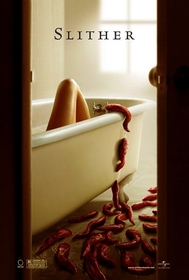Our editor-in-chief Nate Yapp is proud to have contributed to the new book Hidden Horror: A Celebration of 101 Underrated and Overlooked Fright Flicks, edited by Aaron Christensen. Another contributors include Anthony Timpone, B.J. Colangelo, Dave Alexander, Classic-Horror.com's own Robert C. Ring and John W. Bowen. Pick up a copy today from Amazon.com!
Slither (2006)
Screenwriter James Gunn (Tromeo and Juliet, Dawn of the Dead '04) makes his feature-length directorial debut with Slither, and within the first few minutes, he assuredly shows us he knows how to set the tone for a film. A gigantic meteor hurtles through space, heading for certain disastrous impact with Earth. As it hits our atmosphere, however, it begins to burn up, the layers peeling back. When it finally squelches into the muddy woodlands of sleepy Southern burg Wheelsy, it is as a background joke in a completely different scene. Of course, this being a horror film, the tiny, baseball-sized rock cracks open, promising far more insidious spectacle.
Gunn's approach to the entire film can be summed up thusly -- what should have catastrophic, earth-shattering repercussions instead sidles in from the side, underwritten by a thick, pulsing vein of over-the-top dry humor (which might well be an oxymoron in any other film, but Slither somehow fits it together without much muss).
The meteor spits out a globby alien slug, which is eventually discovered by local businessman and part-time asshole Grant Grant (Michael Rooker). Grant gets a spike to the chest and he gets one hell of a genetic reprogramming. Within days he transforms into a freakish tentacle monster, to the horror of his wife Starla (Elizabeth Banks) and local Chief of Police Bill Pardy (Nathan Fillion). Then come the blood-red slugs... did I mention the slugs? What about the giant womb-woman? The acid-spitting zombies? You get all this and more in Slither, but Gunn keeps his head and never makes it about the freaky alien creatures, which is why I suspect he can get away with a plot that doesn't so much twist as take frequent right turns.
Much of the success of the film comes from the humanity of its characters. Despite the fact that they are facing an alien threat the likes of which has never seen (much like every other alien invasion film), they remain warm, lovable fools who we really would not like to see eaten or zombified. Contrast this to the similarly-plotted 1982 version of The Thing, with its cold, masculine characters who exist more to become the monster than to stop it. The fact that our heroes are played by enjoyable (and well-cast) actors like Fillion and Gregg Henry only add to their charm.
Gunn also gives his main monster a weirdly sympathetic vibe. Despite the new drives for species dominance, Grant still loves his wife Starla very much. In fact, the alien Grant may love her more than the human one did. There's more than one morbidly touching scene set to Air Supply's "Every Woman in the World" where he tries to rekindle the spark, even as he is rapidly transmogrifying into something entirely loathsome. At the same time, Gunn never relents on the surprisingly painful truth -- either Grant goes, or the entire human race does.
The choice becomes easier when you realize that everything Grant does is disturbing at levels that sometimes match the best of David Cronenberg (although lacking the cerebral by-product). In fact, Gunn seems to understand what Cronenberg has really done for the genre -- pointing out the difference between horror and terror. Terror involves an eventual sharp, cathartic knock to the system, followed by a sense of relief, however short-lived. Horror, however, is that grotesque, uneasy feeling that lingers for hours, even days after. Horror is the knowledge that even if you look away, you will still never be rid of the horrifying visions to which you have been a witness. Slither isn't just a horror movie. In many ways, Slither is horror. There are a few old-fashioned "Boo" scares here and there, but for the most part, Gunn oozes the decrepitly fleshy imagery into your brain and lets it lay eggs. Worse (or better), most of the really beautiful putrifications relate to eating and sex. In that sense, Slither is like the Southern rock version of Shivers as directed by Ivan Reitman circa Cannibal Girls.
Then again, Ivan Reitman also made Evolution, and some comparison to that film is also apt. Despite the uneasy, lingering effect of many of the scenes, some of the goofier aspects of Slither also make it feel like a much more disposable film than it is. You don't leave the theater with a burning desire to tell your friends; this film is more like a dirty little secret you keep to yourself.
Part of the problem is that, while Gunn falls into few pitfalls of the burgeoning auteur, the ones he does plunge into are big and obvious. One of the characters, Kylie (Tanya Sauliner), exists almost purely to dispense necessary exposition, and what she doesn't cover, Starla picks up in her convenient role as a schoolteacher. Also, Gunn often follows the funnier moments in the film with a witty remark that gets swallowed up by audience laughter. The lines will probably play well in DVD, but they could have just as easily worked with a facial reaction, especially since Fillion and Henry are both very expressive actors. These are by no means deadly flaws, but they do detract from the film's overall effectiveness.
Depending on your personal taste, you may also find Gunn's fondness for horror in-jokes to be obtrusive. I don't, myself -- I like The Howling and it's much more blatant in this category. Slither contains a number of names lifted straight from horror's history, including Henenlotter (on a banner over Main Street), Tourneur (a cranky cop with one line). Rob Zombie makes a vocal cameo, and Lloyd Kaufman shows up a bum (and, as a Tromatic bonus, The Toxic Avenger plays on a television in one scene). Perhaps the most loving homage, however, is during the scene where Kylie is attacked by an alien slug in her bathtub. The Jaws-esque music not only puts a humorous spin on the sequence, but also makes rethink the context of an almost identical scene in Shivers.
James Gunn's Slither is a hard film to quantify. It's engaging and unnerving, but also lightweight and somewhat unnecessary. I can't say that I necessarily recommend it, but I also believe it would be a shame to miss out on such an exciting, bold slice of horror-comedy. If you're big on bodily horror and bursts of laughter, and if you don't have any plans to eat in the near future, maybe Slither is the right brand of cheerful grotesquerie.
Trivia:








